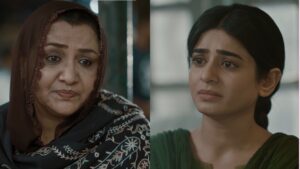“Conversations with Kanwal” is a YouTube channel which has slowly began gaining mainstream following among Pakistani audiences because of how it has become a platform centered around women’s stories. While within our society there is an emergence of popular drama’s like “Mere Pass Tum Ho” and “Dunk’ which are promoting sexist perceptions about women and encouraging violence, “Conversations with Kanwal” has emerged as a safe space for women to discuss issues related to domestic violence, abuse, rape etc. topics that are considered to be a taboo within our society. The show has received a lot of local and international praise for refusing to hide the demons of our society, and giving ordinary women a chance to talk about the difficulties and trials they have faced. The Guardian has even described Kanwal Ahmed, the creator of the show, as Pakistan’s Oprah Winfrey.
In Season 3 episode 5, the topic was abusive marriages in which Kanwal interacted with a mother and her daughter Laraib about the suffocations of toxic marriages and how Pakistani women are deprived of opportunities to escape to protect themselves and their children. The conversation revolved around how women are forced to stay within abusive marriages, and the mother talked about how as a young woman who was abused everyday by her husband, her family and neighbor’s were already aware of the situation yet chose to close their eyes and encouraged her to accept her reality. Even on occasions when the mother pleaded her family members to help her escape the abusive environment, she recalled that they instead told her that she would lose their support if she left her marriage and would call her husband to pick her up.
What stood out as one of the most riveting moments in this episode was when Laraib talked about the emotional impact of domestic abuse which has still stuck with her years later after leaving her father. She talked about her anxiety of not being able to deal with loud voices, and even feeling tensed about failing to complete her chores on time in fear that her father might scream at her again. This was a great challenge to the consistent mantra women are told when they wish to escape their abusive husbands: “your children will lose a father.” In our society, women are consistently reminded not to break up their family because it might harm their children. “Baap ka hath sar par rehna chahiye” is a toxic concept that our society drills into the minds of women and children, which this episode had debunked in an articulate manner. Every child does deserve to live with their mother and father in a loving home, but if they are living in an abusive environment, then this trauma continues to manifest itself even years later and does more harm over children than good.
by Mahnoor Jalal










